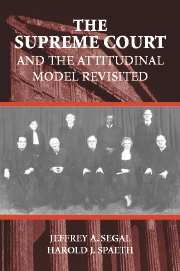Book contents
- Frontmatter
- Contents
- List of Illustrations
- List of Tables
- Preface
- 1 Introduction: Supreme Court Policy Making
- 2 Models of Decision Making: The Legal Model
- 3 Models of Decision Making: The Attitudinal and Rational Choice Models
- 4 A Political History of the Supreme Court
- 5 Staffing the Court
- 6 Getting into Court
- 7 The Decision on the Merits: The Legal Model
- 8 The Decision on the Merits: The Attitudinal and Rational Choice Models
- 9 Opinion Assignment and Opinion Coalitions
- 10 The Supreme Court and Constitutional Democracy
- 11 Conclusion
- Case Index
- General Index
1 - Introduction: Supreme Court Policy Making
Published online by Cambridge University Press: 05 June 2012
- Frontmatter
- Contents
- List of Illustrations
- List of Tables
- Preface
- 1 Introduction: Supreme Court Policy Making
- 2 Models of Decision Making: The Legal Model
- 3 Models of Decision Making: The Attitudinal and Rational Choice Models
- 4 A Political History of the Supreme Court
- 5 Staffing the Court
- 6 Getting into Court
- 7 The Decision on the Merits: The Legal Model
- 8 The Decision on the Merits: The Attitudinal and Rational Choice Models
- 9 Opinion Assignment and Opinion Coalitions
- 10 The Supreme Court and Constitutional Democracy
- 11 Conclusion
- Case Index
- General Index
Summary
If the fatuousness characteristic of Pollyanna had continued to rose-color anyone's attitude toward the U.S. Supreme Court, the decision in Bush v. Gore must have been mind-boggling. More neatly than we might have imagined, the Court's three most conservative justices – William Rehnquist, Antonin Scalia, and Clarence Thomas – overruled the Florida Supreme Court's interpretation of Florida law and declared that Florida's recount violated the equal protection clause. The Court's two other conservatives, less extremely so than their colleagues – Anthony Kennedy and Sandra Day O'Connor – agreed with the equal-protection violation and ruled with the triumvirate that the current recount was illegal and set a deadline (two hours hence!) that made any subsequent recount impossible. Two moderates, David Souter and Stephen Breyer, found equal protection problems with the recount but thought the problems solvable; whereas the Court's most liberal members, Ruth Bader Ginsburg and John Paul Stevens, who usually support equal protection claims, found nothing wrong with the recount. As we declared in 1993, “… if a case on the outcome of a presidential election should reach the Supreme Court … the Court's decision might well turn on the personal preferences of the justices.”
The justices in the majority, who historically have resisted Fourteenth Amendment claims far more than their colleagues, rested their decision on a blithely asserted violation of the equal protection clause. Unbroken precedent had held that such a violation requires purposeful discrimination, but clearly this pattern did not preclude the majority from reaching its preferred outcome.
- Type
- Chapter
- Information
- Publisher: Cambridge University PressPrint publication year: 2002



